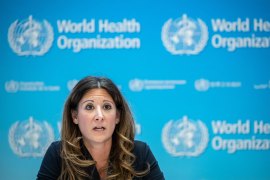News Outlets Look At How H1N1 Will Inform WHO’s Future Outbreak Response
Following the WHO's decision on Tuesday to declare the H1N1 (swine flu) pandemic over, several news outlets reviewed the emergence of the virus around the world, exploring how some of the lessons learned from H1N1 could assist the WHO's handling of future outbreaks.
"Swine flu has killed more than 18,449 people and affected some 214 countries and territories since it was uncovered in Mexico and the United States in April 2009, according to WHO data," Agence France-Presse writes. "After petering out in Europe and the United States before their winter flu season was over, in recent months swine flu has affected parts of South Asia and 'limited areas' of tropical South and Central America, as well as Africa for their second season. But unlike 2009, when A(H1N1) ousted most other types of flu viruses around the world, known seasonal viruses now are prevalent and even dominant in countries such as South Africa" (Capella, 8/10).
"In the United States and Europe, health agencies and governments closed the book on H1N1 months ago. But worldwide, the illness continued to spread In India, China, New Zealand and Australia, H1N1 continues to spread, albeit at unseasonably low levels and with relatively mild impact," AOL News writes. "In India, health experts are warning that monsoon rains could mean a stronger second wave of H1N1 infections" (Drummond, 8/10).
Still, on Tuesday, Chan "acknowledged that the pandemic turned out to be far less severe than officials had originally feared," the Washington Post's "The Checkup" blog writes.
"This time around we have been aided by pure good luck," Chan said. "The virus did not mutate during the pandemic to a more lethal form. Widespread resistance to oseltamivir [Tamiflu] did not develop. The vaccine proved to be a good match with circulating viruses and showed an excellent safety profile. Thanks to extensive preparedness and support form the international community, even countries with very weak health systems were able to detect cases and report them promptly," Chan added.
However, "the WHO has been criticized for exaggerating the risk posed by the pandemic, prompting countries to spend billions of dollars on vaccine and other defenses," the blog adds. H1N1 claimed the lives of "far less than a typical flu season" (Stein, 8/10).
On Tuesday, Chan defended the WHO's decision to declare H1N1 a pandemic, "[b]ut she did add that in the future, a 'more flexible' approach to pandemic preparedness guidelines would allow WHO to present best-, intermediate- and worst-case scenarios and to adjust predictions as a pandemic evolves," the Wall Street Journal's "Health Blog" reports. "That was one of the lessons she said the agency took away from the H1N1 pandemic; the other was the need to better communicate through social media," the blog adds (Hobson, 8/10).
AOL News explores some of the major criticisms of the WHO's handling of the H1N1 outbreak, which the news agency writes, "was marked by a frenzy, massive financial losses and charges of mismanagement." H1N1 highlighted the "dearth of access" that populations living in developing countries had to H1N1 vaccines and medicines to mitigate the symptoms of the flu, as well as unresolved issues with the WHO's "six-stage pandemic alert system" and "the International Health Regulations [IHR], which outline the response capacities necessary among member countries."
"H1N1 served as a stark reminder that the new regulations, which were instituted in 2005 and are accompanied by a 2012 deadline for compliance, are nowhere close to being met by developing countries," the news service continues. "There is a disaster in global equity," said David Fidler, a professor at Indiana University and International Health Law expert. "These IHR capacities are the elephant in the room: Where are the resources for those countries to get ready, so that if the next outbreak is worse, they're ready to go?"
The article examines questions raised about how such issues will be addressed in the future and includes comments by Albert Wu, a professor at Johns Hopkins Bloomberg School of Public Health (8/10).
USAID, U.N., ASEAN To Host Pandemic Preparedness, Response Exercise In Cambodia
Xinhua reports USAID and the U.N. are teaming up with the Association of Southeast Asian Nations (ASEAN) to host "a pandemic preparedness and response exercise focusing on managing the impacts of severe pandemics on societies, governments and organizations in the Southeast Asian region" (8/10).
The exercise, which is scheduled to take place in Phnom Penh, Cambodia on 16-20 August 2010, "aims to improve the capabilities of ASEAN member states, both individually and collectively, to prepare for and respond to a severe pandemic with potentially devastating effects on the region," according to a joint press release issued by the agencies involved. "The exercise also sets out to improve multisectoral preparedness and response at the country, regional and global level among the member states and other international actors" (8/10).
This is part of the Morning Briefing, a summary of health policy coverage from major news organizations. Sign up for an email subscription.





